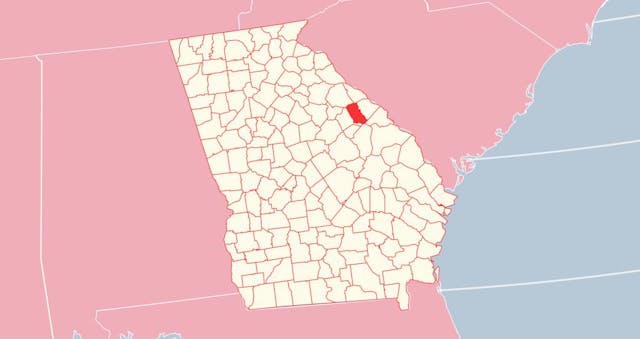Rehabs in McDuffie
On October 18, 1870, McDuffie County was established in the U.S. state of Georgia. It was given the name George McDuffie, the governor, and senator of South Carolina. Thomson serves as the administrative center. Its population was 21,400 in 2020.
The average cost of personal healthcare in Georgia in 2014 was $6,587. Comparing the number to now, there has been an increase of 5.41%. Primary care physicians see 1,957 patients annually on average. This represents an increase of 0.154% over the prior year.
McDuffie County rehab facilities and hospitals secure healthcare to help reduce these figures. They have helped many people recover and lead normal lives today. They give their customers access to a range of restorative programs. The customers, in their turn, adhere to a step-by-step procedure.
Drug and Alcohol Evaluation
The evaluation process comes first. It usually lasts between 60 and 90 minutes. Screening, evaluation, and advisory services are typically part of the process. If you have a problem, the screening will reveal that.
The assessment process follows if you do have an issue. For this, the specialists ask you several questions. The questions cover a variety of topics. They concern your past and present substance use, emotional well-being, and physical health.
Thus, this process indicates how serious your situation is. After that, specialists will assist you in selecting the McDuffie County rehab that is best for you.
Detoxification Procedure
The detoxification procedure is the second step you must take. It cleans your body of the toxic substance that you have used. After this process, though, some unpleasant side effects may occur.
Some people want to detox without the help of doctors, but it is dangerous if you want to get rid of addictive substances. The side effects may be harmful, which is why medical and psychological assistance is important.
Although the programs are typically standard, they can be altered. This depends on the client and their situation. Georgia has 72 medical detox facilities. Among them, 19 offer inpatient care, and 59 offer outpatient care.
Types of Rehabs in McDuffie County, Georgia
Many centers are operating here that offer a special level of care and support. Among them are Southeast Detox, The Summit Wellness Group—Roswell, Carter Treatment Center, and others.
The programs they offer consist of different parts. They are the following:
Inpatient
These are living-in facilities that offer therapy to drug and alcohol addicts. Here, you can get specialized therapy plans and resources. Through these facilities, you will beat alcohol and drug addiction.
A long-term inpatient drug recovery can put a client back on the road to a productive, content life without drugs. Depending on the recovery chosen, costs range from free to very expensive.
These centers are required by law to keep your visit and treatment information private. It is handled as if it were an appointment with a doctor.
Outpatient
Unlike the previous one, outpatient centers enable people to stay in their own homes. The customer will continue to be in charge of their own life. They can still go to work or find a job with the assistance and support they receive, and they can begin to rebuild their personal lives.
According to this predetermined treatment plan, participants must attend counseling services regularly. Clients can carry on with their lives with the support of their family and friends, as well as the facility.
Outpatient drug detox facilities may find great success with the 12 Step program's approach to counseling. It is founded on peer support, which is crucial for a sustained recovery.
Partial Hospitalization Program or PHP
In comparison to the ones mentioned above, this is a minor step back. It typically provides 4-6 hours of daily programming that is quite well-organized. In this case, patients spend the day at the hospital and return home at night.
Despite not being inpatients, they nonetheless require close medical supervision. Families and caregivers should be in favor of the treatment plan. They ought to be able to provide a safe and supportive environment at home.
Insurance Plans for Addiction Treatment
86.1% of the population here has access to health insurance. They use a variety of plans, including:
36.2% - employee
23.3% - Medicaid
12.5% - Medicare
10.8% - non-group
3.36% - military or VA
Payment Options Without Insurance
If you don't have insurance but still want to get help, there are other options available. Here are a few of those alternatives, which will also be beneficial if you don't currently have the funds (or the means) to pay for your treatment:
Financing
Scholarship and grant funding
Coverage at a discount
Adjustable scale
Fundraising
Network

